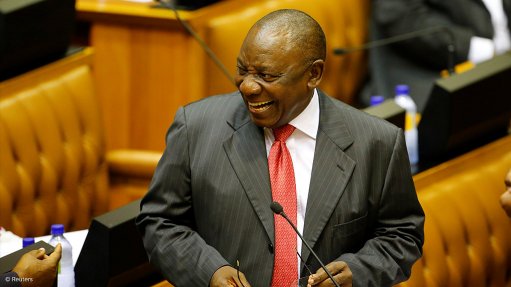
President Cyril Ramaphosa
Photo by: Reuters
President Cyril Ramaphosa confirmed on Thursday that South Africa’s embattled State-owned electricity producer would be split, under Eskom Holdings, into three separate entities – generation, transmission and distribution – in an effort to bring credibility to the turnaround of the utility and to position South Africa’s power sector for the future.
Eskom, Ramaphosa said in his State of the Nation Address, was in crisis and posed risks that could severely damage the country’s economic and social development ambitions. “We need to take bold decisions and decisive action. The consequences may be painful, but they will be even more devastating if we delay.”
Eskom's new business model would be introduced immediately and should take into account the root causes of its current crisis and the profound international and local changes in the relative costs, and market penetration of energy resources, especially clean technologies.
"It needs to take into account the role that Eskom itself should play in clean generation technologies."
Ramaphosa said the split of the utility into three independent units would ensure that costs were isolated and that each entity was given appropriate responsibility. This would enable Eskom to raise funding for its various operations more "easily from funders and the market".
"Of particular and immediate importance is the entity to manage an independent State-owned transmission grid combined with the systems operator and power planning, procurement and buying functions. It is imperative that we undertake these measures without delay to stabilise Eskom’s finances, ensure security of electricity supply, and establish the basis for long-term sustainability."
The President stressed that there would be “meaningful consultation and dialogue with all key stakeholders” as government moved to addressed Eskom’s challenges.
“We will lead a process with labour, Eskom and other stakeholders to work out the details of a just transition, and proper, credible and sustainable plans that will address the needs of all those who may be affected.”
The promise of consultation comes amid considerable opposition to any Eskom restructuring from various labour unions, including those falling under the umbrella of the Congress of South African Trade Unions, which is in an alliance with the governing African National Congress.
There is particular apprehension that the restructuring could result in job losses and there is also a strong suspicion that it could become the precursor to privatisation.
However, business is supportive of reform, having warned on several occasions that Eskom's current model is no longer fit for purpose.
Likewise, energy experts have argued that, unless changes are made, Eskom will fall victim to a utility death spiral, whereby sales fall as costs surge, and will also be ill-equipped to deal with the technological changes that are disrupting the electricity industry domestically and abroad.
BALANCE SHEET SUPPORT
Ramaphosa also used his address to announce that government would provide support to Eskom’s debt-laden balance sheet and said that the details would be provided by Finance Minister Tito Mboweni in his Budget speech on February 20.
“This we will do without burdening the fiscus with unmanageable debt."
Ramaphosa also called on Eskom to take urgent steps to significantly reduce its costs, but said the utility would require more revenue through an affordable tariff increase.
“As we address the challenges that face Eskom, we also need to safeguard our national fiscal framework, achieve a positive impact on our sovereign credit rating and pay attention to the rights and obligations of Eskom’s funders.”
Steps to reduce municipal non-payment and confront the culture of non-payment that exists in some communities also needed to be taken. "It is imperative that all those who use electricity – over and above the free basic electricity provided – should pay for it."
Ramaphosa’s remarks on Eskom were framed within five priorities, which he described as the “most urgent tasks” for 2019 and included:
- Accelerating inclusive economic growth and creating jobs.
- Improving the education system and developing the skills that are needed now and into the future.
- Improving the conditions of life for all South Africans, especially the poor.
- Stepping up the fight against corruption and State capture.
- And strengthening the capacity of the State to address the needs of the people.
“These are tasks that will underpin everything that we do this year," Ramaphosa said, while also announcing that South Africa's national election would be held on May 8.